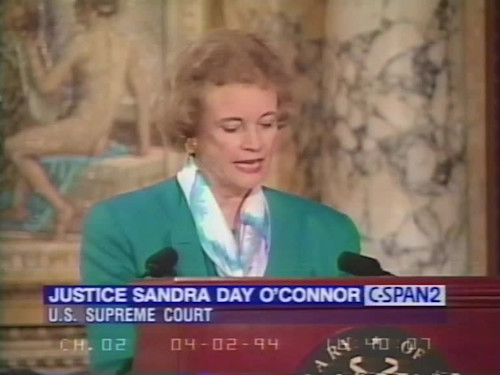By Justice Sandra Day O'Connor
Remarks to Supreme Court Historical Society introducing a lecture on "Taney, Lincoln, and the Constitutional Convention"
March 30, 1994

DISCLAIMER: This text has been transcribed automatically and may contain substantial inaccuracies due to the limitations of automatic transcription technology. This transcript is intended only to make the content of this document more easily discoverable and searchable. If you would like to quote the exact text of this document in any piece of work or research, please view the original using the link above and gather your quote directly from the source. The Sandra Day O'Connor Institute does not warrant, represent, or guarantee in any way that the text below is accurate.
Transcript
(Automatically generated)
Sandra Day O'Connor [automatically transcribed, may contain inaccuracies]
Thank you. Thank you. Thank you. Welcome to the second half of the lecture series. I happen to be very enthusiastic about the lecture series sponsored by these two organizations. We justices love our history. So I'm here to learn a little more along with you tonight. Our lecture this evening is Professor Philip pallidum of the University of Kansas. He is the author of five books dealing with the Civil War period in our nation's history, and numerous published articles. No one is better qualified than he to participate in this lecture series about the Supreme Court during the Civil War period. He will speak to us tonight about Chief Justice Taney President Lincoln and the constitutional conversation. Chief Justice Roger Brooke Taney was from Calvert County, Maryland. I think I was asked to introduce the speaker tonight because I believe I am not only justice sense Chief Justice Taney to live in the state of Maryland. But be that as it may, he married and key, the sister of Francis Scott Key who wrote the Star Spangled Banner.
Taney came from an agrarian family. In fact, I think they grew tobacco, and he inherited some slaves. Boom, he laid her set free, but he believed that the federal government had no authority to limit or abolish slavery. He thought that authority resided only in the States. He was a federalist and when the Fed Roll a party fell into disarray. He became a Jacksonian Democrat, which led him time to his appointment as Attorney General of the United States. President Jackson later made Taney Secretary of the Treasury to help the president move federal funds to state banks. The Senate refused to confirm the appointment of Secretary of the Treasury. And when President Jackson nominated Roger Brook Taney as, as an Associate Justice on the Supreme Court, the Senate rejected that nomination as well. Chief Justice john Marshall died in 1835, opening a vacancy, President Jackson not wanting to be daunted by fade or nominated Roger Brooke Taney as Chief Justice and a nominated Philip barber to build Still Bank of bacon Associate Justice position on the court. Surprisingly, the Senate confirmed both nominations. Chief Justice Taney served for 28 years as Chief Justice until 1864. He helped the court work productively and successfully in the post Marshall years, opening economic opportunities as the nation expanded westward. He is remembered, however, for just one case, Scott versus Sanford. The infamous Dred Scott opinion, which many scholars believe is the worst ever rendered by the Supreme Court of the United States. In a case that began innocuous slight, with the suit in Missouri by Dred Scott to obtain a declaration of his freedom from slavery based on Missouri law, the case Stand up and federal court and was used by the seven member majority of the Supreme Court and an opinion authored by Chief Justice Taney to establish that blacks were not citizens of the United States and had no right to sue in federal court, that slaves were property protected as such by the Constitution, and that the Missouri Compromise was invalid. The decision triggered a violent reaction and at undermine the prestige of the court. It moved our nation toward the most destructive war in its history. Chief Justice Taney's reputation was forever tarnished. President Lincoln had several things to complain about, as far as the Supreme Court was concerned. And the Dred Scott decision was not the only cause of his complaint. But he had an opportunity President to shape a court by filling five vacancies on the court in less than three years. He nominated justices Wayne Miller, Davis, Bo, and finally Chief Justice salmon chase to replace Chief Justice Taney when he died in 1864. There is a story to tell about each one of these, but I've used too much time already. Please join me tonight in welcoming Professor Paladin
